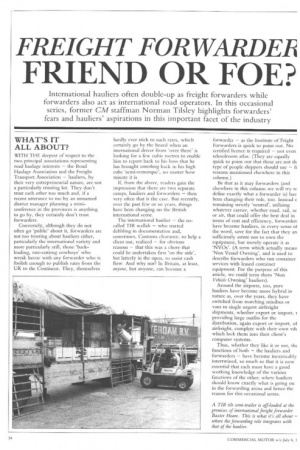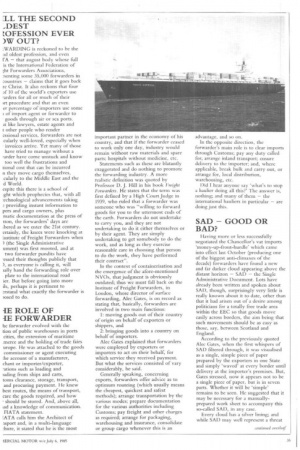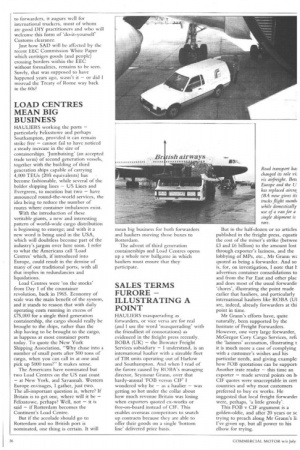FREIGHT FORWARDEL
Page 36

Page 37

Page 38

If you've noticed an error in this article please click here to report it so we can fix it.
FRIEND OR FOE?
International hauliers often double-up as freight forwarders while forwarders also act as international road operators. In this occasional
series, former GM staffman Norman Tilsley highlights forwarders' fears and hauliers' aspirations in this important facet of the industry
WHAT'S IT ALL ABOUT?
WITH THE deepest of respect to the two principal associations representing road haulage interests — the Road Haulage Association and the Freight Transport Association — hauliers, by their very entrepreneurial nature, are not a particularly trusting lot. They don't trust each other too much and, if a recent utterance to me by an unnamed district manager planning a miniconference in the provinces is anything to go by, they certainly don't trust forwarders.
Conversely, although they do not often go 'public' about it, forwarders are not too trusting about hauliers either, particularly the international variety and more particularly still, those 'backloading, rate-cutting cowboys' who wreak havoc with any forwarder who is foolish enough to publish rates from the UK to the Continent. They, themselves
hardly ever stick to such rates, which certainly go by the board when an international driver from 'over there' is looking for a few cubic metres to enable him to report back to his boss that he has brought something back in his high cube `semi-remorque', no matter how minute it is.
If, from the above, readers gain the impression that there are two separate camps, hauliers and forwarders — then very often that is the case. But recently, over the past few or so years, things have been changing on the British international scene.
The international haulier — the socalled 'FIR wallah — who started dabbling in documentation and, sometimes, Customs clearance, to help a client out, realized — for obvious reasons — that this was a chore that could be undertaken first 'on the side', but latterly in the open, to assist cash flow. And why not? In Britain, at least, anyone, but anyone, can become a
forwarder — as the Institute of Fright Forwarders is quick to point out. No certified licence is required — not even schoolroom atlas. (They arc equally quick to point out that these are not th type of people shippers should use — reasons mentioned elsewhere in this column,)
Be that as it may forwarders (and elsewhere in this column we will try tc define exactly what a forwarder is) hay been changing their role, too. Instead c remaining strictly 'neutral', utilising whatever carrier, whether road, rail, se or air, that could offer the best deal in terms of cost and efficiency, forwarden have become hauliers, in every sense ol the word, save for the fact that they an sufficiently astute not to own the equipment, but merely operate it as 'NVOs'. (A term which actually means 'Non Vessel Owning', and is used to describe forwarders who run container services with leased container equipment. For the purpose of this article, we could term them 'Non Vehicle Owning' hauliers).
Around the airports, too, pure hauliers have become more hybrid in nature as, over the years, they have switched from matching minibus or vans to single urgent airfreight shipments, whether export or import, t providing large outfits for the distribution, again export or import, of airfreight, complcte with their own vdi which lock them into their client's computer systems.
Thus, whether they like it or not, tht functions of both — the hauliers and forwarders — have become inextricably intertwined, so much so that it is now essential that each must have a good working knowledge of the various functions of the other; where hauliers should know exactly what is going on in the forwarding arena and hence the reason for this occasional series.
[LL THE SECOND DEST tOFESSION EVER )W OUT?
LWARDING is reckoned to be the -id oldest profession, and even — that august body whose full is the International Federation of ;ht Forwarders Associations, :•.senting sonic 35,000 forwarders in ;:ountries — claims that it goes back re Christ. It also reckons that four pf 10 of the world's exporters use 'arders for all or much of their In procedure and that an even er percentage of importers use some of import agent or forwarder to goods through air or sea ports. at like lawyers, estate agents and t other people who render essional services, forwarders are not cularly well-loved, especially when invoices arrive. Yet many of those have tried to manage without a ,arder have come unstuck and know too well the frustrations and tional cost that can be incurred n they move cargo themselves, .cularly to the Middle East and the
d World.
espite this there is a school of .ght which prophecies that, with all :echnological advancements taking providing instant information to pets and cargo owners, plus
matic documentation at the press of Eton, the forwarders' days are Lbered as we enter the 21st century. ertainly, the knees were knocking at Institute of Freight Forwarders when ) (the Single Administrative ument) was first mooted, and at two forwarder pundits have .cssed their thoughts publicly that ), as everyone is calling it, will tally hand the forwarding role over plate to the international road ier. But before going into more ils, perhaps it is pertinent to rstand what exactly the forwarder is iosed to do.
HIE ROLE OF IE FORWARDER
he forwarder evolved with the tion of public warehouses in ports cities, the extension of maritime merce and the holding of trade fairs urope. He was attached to the goods commissioner or agent executing :he account of a manufacturer, chant or importer/exporter,
-ations such as loading and oading from ships and carts, toms clearance, storage, transport, and procuring payment. I le knew best routes, the means of transport, care the goods required, and how should be stored. And, above all, lad a knowledge of communication. FIATA statement.
lATA calls him the Architect of asport and, in a multi-language ;hure, it stated that he is the most important partner in the economy of his country, and that if the forwarder ceased to work only one day, industry would remain without raw materials and spare parts; hospitals without medicine, etc.
Statements such as these are blatantly exaggerated and do nothing to promote the forwarding industry. A more realistic definition was quoted by Professor D. J. Hill in his book FreiRht Forwarders. He states that the term was first defined by a High Court Judge in 1939, who ruled that a forwarder was someone who was "willing to forward goods for you to the uttermost ends of the earth. Forwarders do not undertake to carry you, and they are not undertaking to do it either themselves or by their agent. They are simply undertaking to get somebody to do the work, and as long as they exercise reasonable care in choosing that person to do the work, they have performed their contract".
In the context of containerisation and the emergence of the afore-mentioned Is41/0s, that judgment is obviously outdated; thus we must fall back on the Institute of Freight Forwarders, in London, whoSe director of surface forwarding, Alec Gates, is on record as stating that, basically, forwarders are involved in two main functions: 1: moving goods out of their country of origin on behalf of exporters or shippers, and 2: bringing goods into a country on behalf of importers.
Alec Gates explained that forwarders were employed by exporters or importers to act on their behalf, for which service they received payment. But what the services consisted of vary considerably, he said.
Generally speaking, concerning exports, forwarders offer advice as to optimum routeing (which usually means the cheapest, quickest and safest methods); arrange transportation by the various modes; prepare documentation for the various authorities including Customs; pay freight and other charges as required; arrange for packaging, warehousing and insurance, consolidate or group cargo whenever this is an advantage, and so on.
In the opposite direction, the forwarder's main role is to clear imports through Customs; pay any duty called for; arrange inland transport; ensure delivery to the importer; and, where applicable, break bulk and carry out, or arrange for, local distribution, warehousing, etc.
Did I hear anyone say 'what's to stop a haulier doing all this?' The answer is, nothing; and many of them — the international hauliers in particular — are doing just this.
SAD GOOD OR BAD?
Having more or less successfully negotiated the Chancellor's vat imports 'money-up-front-hurdle' which came into effect last October (producing one of the biggest anti-climaxes of the decade) forwarders have found a new and far darker cloud appearing above the distant horizon — SAD — the Single Administrative Document. Lots have already been written and spoken about SAD, though, surprisingly very little is really known about it to date, other than that it had arisen out of a desire among politicians for a totally free trade area within the EEC so that goods move easily across borders, the aim being that such movements should be as easy as those, say, between Scotland and England.
According to the previously quoted Alec Gates, when the first whispers of SAD filtered through, it was visualised as a single, simple piece of paper prepared by the exporters in one State and simply 'waved' at every border until delivery at the importer's premises. But, Gates stressed, now it appears not to be a single piece of paper, but is in seven parts. Whether it will be 'simple' remains to be seen. He suggested that it may be necessary for a manuallyprepared work sheet to accompany this so-called SAD, in any case.
Every cloud has a silver lining; and while SAD may well represent a threat to forwarders, it augurs well for international truckers, most of whom are good DIY practitioners and who will welcome this form of 'do-it-yourself Customs clearance.
Just how SAD will be affected by the recent EEC Commission White Paper which envisiges goods (and people) crossing borders within the EEC without formalities, remains to be seen. Surely, that was supposed to have happened years ago, wasn't it — or did I misread the Treaty of Rome way back in the 60s?
LOAD CENTRES MEAN BIG BUSINESS
HAULIERS working the ports — particularly Felixstowe and perhaps Southampton, provided it can remain strike free — cannot fail to have noticed a steady increase in the size of containerships. 'Jumboising' (an accepted trade term) of second generation vessels, together with the building of third generation ships capable of carrying 4,000 TEUs (20ft equivalents) has become fashionable, while several of the bolder shipping lines — US Lines and Evergreen, to mention but two — have announced round-the-world services, the idea being to reduce the number of routes where container imbalances exist.
With the introduction of these veritable giants, a new and interesting pattern of world-wide cargo distribution is beginning to emerge; and with it a new word is being used in the USA, which will doubtless become part of the industry's jargon over here soon. I refer to what the Americans call 'Load Centres' which, if introduced into Europe, could result in the demise of many of our traditional ports, with all that implies in redundancies and liquidations.
Load Centres were 'on the stocks' from Day 1 of the countainer revolution, back in 1965. Economy of scale was the main benefit of the system, and it stands to reason that with daily operating costs running in excess of .05,000 for a single third generation containership, the cargo should really be brought to the ships, rather than the ship having to be brought to the cargo, as happens at most container ports today. To quote the New York Shipping Association, "Why chase into a number of small ports after 500 tons of cargo, when you can call in at one and pick up 5000 tons?" It makes sense.
The Americans have nominated but two Load Centres on the US east coast — at New York, and Savannah. Western Europe envisages, I gather, just two. The all-important question is, where? If Britain is to get one, where will it be — Felixstowe, perhaps? Well, not — it is said — if Rotterdam becomes the Continent's Load Centre.
But if the accolade should go to Rotterdam and no British port is nominated, one thing is certain. It will mean big business for both forwarders and hauliers moving those boxes to Rotterdam.
The advent of third generation containerships and Load Centres opens up a whole new ballgame in which hauliers must ensure that they participate.
SALES TERMS FURORE ILLUSTRATING A POINT
HAULIERS masquerading as forwarders, or vice versa are for real (arid I use the word 'masquerading' with the friendliest of connotations) as evidenced in the freight press recently. ROBA (UK) — the Bowater Freight Services subsidiary — I understand, is an international haulier with a sizeable fleet of TIR units operating out of Harlow and Southampton. And when I read of the furore caused by ROBA's managing director, Seymour Grann, over that hardy-annual 'FOB versus CIF' I wondered why he — as a haulier — was getting so hot under the collar about how much revenue Britain was losing when exporters quoted ex-works or free-on-board instead of CIF. This enables overseas competitors to snatch up contracts because they are able to offer their goods on a single 'bottom line' delivered price basis.
But in the half-dozen or so articles published in the freight press, equatii the cost of the miner's strike (betwee 0 and £6 billion) to the amount lost through exporter's laziness, and the lobbying of MPs, etc., Mr Grann wz quoted as being a forwarder. And so is, for, on investigation, I note that I-. advertises container consolidations to and from the Far East and other plac and does most of the usual forwardir 'chores', illustrating the point made earlier that hauliers, and particularly international hauliers like ROBA (Ul are, indeed, already forwarders at thi point in time.
Mr Grann's efforts have, quite naturally, been supported by the Institute of Freight Forwarders. However, one very large forwarder, McGregor Cory Cargo Services, reft the 'laziness' accusation, illustrating t it is much more a case of complying with a customer's wishes and his particular needs, and giving example: how FOB quotations can be support' Another irate reader — this time an exporter — made several points on h. CIF quotes were unacceptable in cert countries and why most customers preferred to buy ex works. He suggested that local freight forwardei were, perhaps, 'a little greedy'.
This FOB v CIF argument is a golden-oldie, and after 20 years or sc trying to preach along Mr Grann's lii I've given up, but all power to his elbow for trying.




































































































